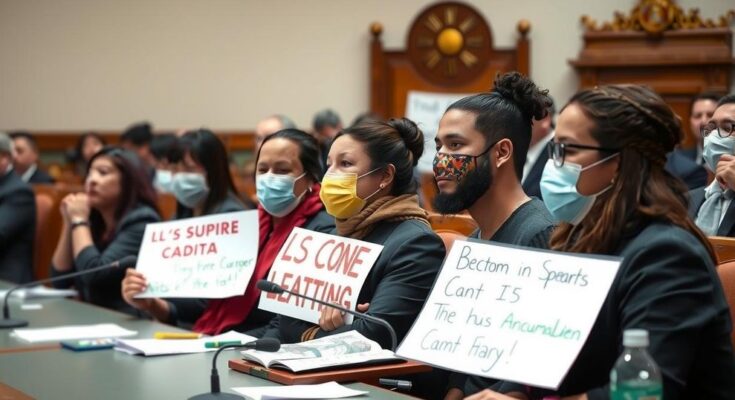Four Moroccan activists, including Said Ait Mahdi, are in court facing charges of defamation and insulting public officials for criticizing the government’s response to the 2023 earthquake, which killed nearly 3,000 people and destroyed tens of thousands of homes. Ait Mahdi remains in custody while the other three are free pending trial. The government has issued over 57,000 reconstruction permits and allocated $740 million for rebuilding efforts.
On Monday, four activists who have been advocating for the victims of the 2023 earthquake in Morocco appeared in court, facing various charges including defamation. Among them, Said Ait Mahdi, the head of the Al Haouz Earthquake Victims Coordination, remains in custody due to allegations of defaming public officials, insulting the authorities, and disseminating false information. The other three activists have been released but are also charged with similar offenses, all stemming from social media criticisms of the government’s response to the disaster.
The earthquake, which struck Morocco in September 2023, resulted in the tragic loss of nearly 3,000 lives and the destruction of tens of thousands of homes in the High Atlas mountains. Following the disaster, Ait Mahdi’s organization has been vocal in urging the government to expedite reconstruction processes to assist the displaced families. Moroccan authorities have reportedly issued more than 57,000 reconstruction permits and have allocated around $740 million to facilitate the rebuilding of affected areas.
The legal proceedings against the activists underscore a growing tension between civil society and government officials in Morocco in the wake of the September earthquake. This catastrophic event not only devastated the infrastructure but also highlighted the challenges faced by domestic authorities in promptly addressing the needs of disaster victims. The public outcry has been amplified through social media, where activists have criticized the pace of governmental response, raising questions about accountability and transparency within the administration. As reconstruction efforts continue, the dialogue around governmental responsibility and citizen advocacy remains critical.
The court appearance of the four activists serves as a significant indicator of civil society’s struggle for accountability in Morocco’s post-earthquake context. While the government has pledged substantial financial resources and permits for reconstruction, the calls from activists for rapid action reflect a deep concern for the affected populations. The outcome of this case may have broader implications for the relationship between citizens and their government in terms of expressing dissent and advocating for change.
Original Source: newscentral.africa




